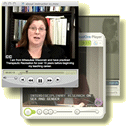Featured Entries
Websites:
Know a good UD website or resource?
Tools and Resources
Videos and Clips

Links to streamable videos developed by others working in universal design are provided here for training and information. Downloadable clips developed by the ACCESS-ed Project present specific universal design examples of accessibility implementations - both the "Accessibility Gems and the Bloopers".
15 items

"Rolling"
This captioned documentary film was created largely by 3 participants with video cameras mounted on their wheelchairs. It was named the best documentary at the Independent Film Project conference in New York City.
Thirteen/WNET New York (public television)

"Ten Employment Myths"
"Many employers misunderstand the Americans with Disabilities Act and are reluctant to hire people with disabilities because of unfounded myths. This seventeen minute video responds to concerns expressed by employers, explaining the ADA in common sense terms and dispelling myths about this often overlooked pool of well-qualified employees." Find this video in the ADA Video Gallery by clicking on this link.
The U. S. Department of Justice

Access Symbols
This link provides downloadable access symbols, provided copyright free, for closed captioning, descriptive video, and web access.
WGBH website

Access to Technology: An Online Tutorial
This page provides publications and videos that are developed to describe how people with disabilities use computers. This website also contains links to disability related websites.
DO-IT, University of Washington

AIM National Center's You Tube Channel
This You Tube channel from the National Center for Accessible Instructional Materials (AIM Center) includes videos with tips: Introducing AIM to Students and Technology and Skills for students and instructors,
National Center for Accessible Instructional Materials

Automatic Door Blooper
This short video demonstrates a poor application of automatic door accessibility considerations. The placement of operating buttons may fall within the minimal ADAAG standard, but is it really accessible? A service dog cannot "nose" the button to open the door. If a dog uses a paw to attempt to operate the button his nails scrape on the background surface (which in this case is metal), leading to scrape marks. How will a person with musculo-skeletal fare with this button?
R2D2 Center at UW-Milwaukee

Introduction to Video Description with Video Accessibility Demonstration
Though most of us are thoroughly familiar with closed captioning, video description is a lesser-known but equally essential service used by people with disabilities to access TV. Video description is defined as, "recorded narration of key visual elements of a TV program or movie, timed to fit into the gaps in dialog, and scripted to enable understanding and enjoyment of visual media by people who are blind or visually impaired." A demonstration is available through a video clip of the "Arthur" cartoon.
Federal Communications Commisssion (FCC)

Making IT Communications Accessible
This hour long webinar, originally provided in April of 2011, covers a wide breadth of topics and is easy to follow for people who are not Information Technology experts. Topics include Legal Environment, User Perspective, Document and Web Accessibility, Multi-media - Captions & Transcripts, and Testing for Accessibility. Though the content and slides are very good, the Webinar is not fully accessible with captioning or a transcript.
Gabriel Merrell, Oregon State University

Mobility International USA
This website of the Mobility International USA, a non-profit organization that was co-founded in 1981 by Susan Sygall and Barbara Williams, includes many good resources. MIUSA works in four main areas to provide programs and services including the National Clearinghouse on Disability & Exchange (NCDE), International Development & Disability, MIUSA International Exchange Programs, and Women, Disability and Development. MIUSA also provides internship opportunities. MIUSA is a cross-disability organization serving those with cognitive, hearing, learning, mental health, physical, systemic, vision and other disabilities. The website offers many free or on-request publications and other media resources.
Mobility International USA - MIUSA

Police Response to People with Disabilities
This 8-part video series was designed for use in roll-call training and addresses law enforcement situations involving people who have mobility disabilities, mental illnesses, mental retardation, epilepsy or seizure disorders, speech disabilities, deafness or hard of hearing, and blindness or low vision. The eight segments range from 5 ½ to 10 ½ minutes in length. (2006)
Department of Justice

Standards for Audio Description and Code of Professional conduct for Describers
This pdf document (available for download) from the Audio Description Coalition offers guidelines and a Code of Professional Conduct for Describers. The document was compiled by a group of audio describers and trainers from across the United States, based on their combined training, experience, knowledge, and resources. For more information, contact www.AudioDescriptionCoalition.org.
Audio Description Coalition

Universal Design in the Kitchen
This video highlights the features of the kitchen in the CRDA Universal Design Demo home. In it you will find a lot of good ideas for your own home modifications. Pay particular attention to the kitchen sink. Accesssiblity of kitchen componenents
AgeInPlace.com

Video Description of a trailer for Disney's Frozen
Disney's Frozen Trailer Video Description - Video descriptions are narrative description of the key visual elements taking place during the movie. The video descriptions are placed in the pauses of the dialog of characters. Programs with video descriptions make the programs more accessible to people who have vision impairments or who are blind.

WebAnywhere - A Screen Reader On The Go
WebAnywhere is a web-based screen reader for the web. It requires no special software to be installed on the client machine and, therefore, enables blind people to access the web from any computer they happen to have access to that has a sound card.The web page includes links to video or audio tutorials for using WebAnywhere.
University of Washington

Website Accessibility
This website provides links, videos and information on how to make websites more accessible and addressing principles of accessible design.
WebAIM






